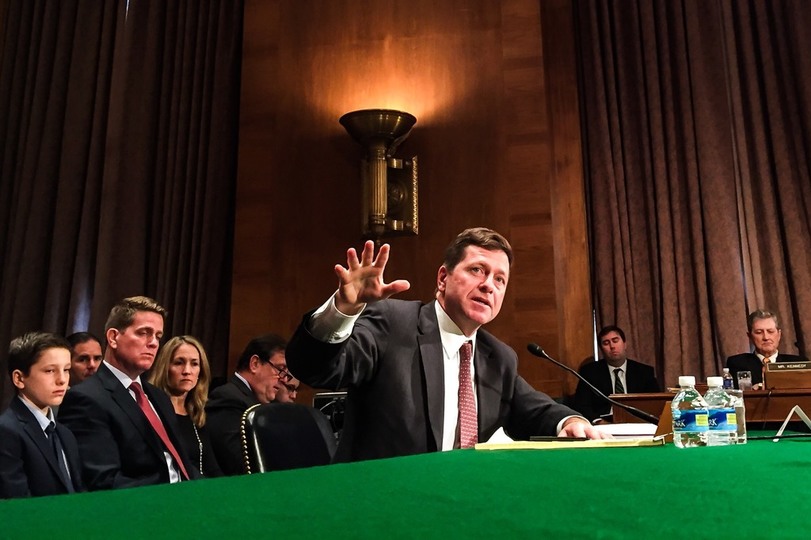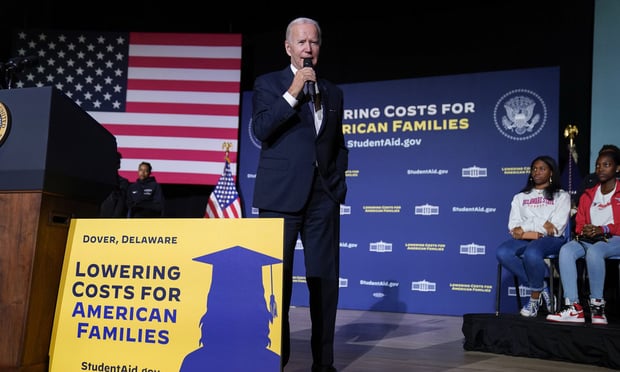 SECchairman Jay Clayton. (Photo: Diego Radzinschi/ALM)
SECchairman Jay Clayton. (Photo: Diego Radzinschi/ALM)
Valic Financial Advisors agreed Tuesday to pay $40 million tothe Securities and Exchange Commission to settle a pair of actionsin which VFA failed to disclose to teachers and other investorspractices that generated millions of dollars in fees and otherfinancial benefits for the firm.
|The SEC levied two actions against VFA, based in Houston. Inthe first, the SEC found that VFA failed todisclose that its parent company paid a for-profit entity owned byFlorida K-12 teachers' unions to promote VFA and its parentcompany's services to teachers.
|The parent company of VFA is the Variable Annuity Life InsuranceCo., a unit of the American International Group.
|In the second action, the SEC found that VFA failed todisclose conflicts of interest regarding its receipt of millions ofdollars of financial benefits that directly resulted from advisoryclient mutual fund investments that were generally more expensivefor clients than other mutual fund investment options available toclients.
|The second action found that despite being eligible to do so,VFA did not self-report its receipt of undisclosed 12b-1 fees aspart of the Division of Enforcement's Share ClassSelection Disclosure Initiative announced in February2018. That initiative ended last year.
|"Teachers need and deserve our attention, and we are dedicatedto ensuring they receive all of the information they are entitledto when making decisions about their financial futures," said SECChairman Jay Clayton, in a statement. "Too often educators aretargeted with misconduct related to their investments. Ournation's educators, and our Main Street investors more generally,are entitled to full and accurate information about the incentivesand conflicts affecting their financial advisors."
|Clayton launched an initiative to target frauds against teacherslast June.
|Without admitting or denying the SEC's findings, VFA consentedto a cease-and-desist order, a censure and a civil penalty of $20million.
|VFA has also agreed to set advisory fees for all Florida K-12teachers who currently participate in its advisory product inFlorida's 403(b) and 457(b) retirement programs, or who currentlyor may within the next five years own certain other Valic FinancialAdvisors products, at its most favorable rates in the Florida K-12market.
|The SEC's order concerning VFA's mutual fund fee disclosurepractices finds that VFA violated Sections 206(2) and 206(4) of theInvestment Advisers Act and Rule 206(4)-7 thereunder.
|Without admitting or denying the SEC's findings, VFA consentedto a cease-and desist order, a censure, disgorgement andprejudgment interest of more than $15.4 million, and a civilpenalty of $4.5 million. The $20 million in monetaryrelief will be placed into a fund for distribution to affectedinvestors.
|"We are pleased to have resolved thesematters involving VALIC Financial Advisors, which is taking allnecessary steps to ensure a robust program of disclosureimprovements and governance enhancements," an AIG spokesperson saidin a Tuesday statement.
|Payments for referrals
VFA is a financial services vendor in nearly every schooldistrict in Florida.
|According to the SEC's order, VFA's parent company, The VariableAnnuity Life Insurance Co. (Valic), for 13 years made payments toan entity owned by the Florida teachers' unions in exchange forthat entity's exclusive endorsement of VFA as its preferredfinancial services partner and the entity's agreement to notpromote or endorse VFA's competitors.
|VALIC also provided the entity owned by the teachers' unionsthree full-time employees to serve as "member benefitcoordinators."
|"These coordinators — who deceptively presented themselves asemployees of the entity owned by the teachers unions — promotedVALIC and VFA to Florida K-12 teachers, including at benefits fairsand financial planning seminars, and referred teachers to VFA forinvestment recommendations," the order states.
|The order finds that the member benefit coordinators increasedVFA's access to K-12 teachers in Florida, and that VFA did notdisclose that the for-profit entity was paid to make VFA itspreferred financial services provider.
|VFA (together with VALIC) earned more than $30 million on theproducts it sold to Florida K-12 teachers during the period coveredby the SEC's order.
|12b-1, wrap fee infractions
The SEC separately charged VFA for making false and misleadingstatements about, and otherwise failing to disclose, conflictsrelated to its receipt of millions of dollars of financial benefitsfrom client mutual fund investments.
|According to the SEC's order, VFA's wrap agreements with itsclients provided that the advisory fee the client paid to VFAincluded the costs to execute securities transactions.
|The order finds that VFA either directly invested or instructedits primary sub-advisor to select new mutual fund investments forclients that were part of VFA's clearing broker's no-transaction-fee program, and thus would not incur a transaction fee VFA wouldbe responsible for paying.
|"The NTF Program mutual funds were generally more expensive thanother mutual funds available to VFA clients, including instanceswhen a less expensive mutual fund share class for the same fund wasavailable outside the NTF Program," the order states.
|VFA also received both 12b-1 fees and revenue sharing from theclearing broker for client investment in mutual funds within theNTF program.
|In addition, according to the order, for clients with wrapagreements in which VFA was responsible for client execution costs,VFA financially benefited by not having to pay any transaction feesfor mutual funds in the NTF program.
|"VFA misled clients by telling them that their advisory feewould cover execution costs without also telling them that VFAwould put them in more expensive mutual fund share classes and thusavoid paying those costs," added Stephani Avakian, co-chief of theSEC's enforcement division. "By not disclosing thesepractices as well as the other financial benefits VFA received, thefirm deprived its clients of essential information about theirrelationship with their adviser and violated core fiduciaryobligations."
Complete your profile to continue reading and get FREE access to BenefitsPRO, part of your ALM digital membership.
Your access to unlimited BenefitsPRO content isn’t changing.
Once you are an ALM digital member, you’ll receive:
- Critical BenefitsPRO information including cutting edge post-reform success strategies, access to educational webcasts and videos, resources from industry leaders, and informative Newsletters.
- Exclusive discounts on ALM, BenefitsPRO magazine and BenefitsPRO.com events
- Access to other award-winning ALM websites including ThinkAdvisor.com and Law.com
Already have an account? Sign In
© 2024 ALM Global, LLC, All Rights Reserved. Request academic re-use from www.copyright.com. All other uses, submit a request to [email protected]. For more information visit Asset & Logo Licensing.








